闵教版六年级小升初英语每日一练试卷21
六年级下册英语试题--小升初基础达标检测(精选试卷)闽教版(含答案)
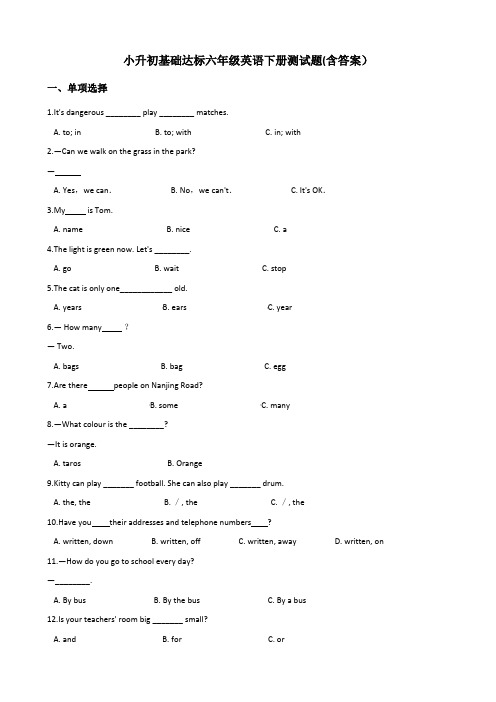
小升初基础达标六年级英语下册测试题(含答案)一、单项选择1.It's dangerous ________ play ________ matches.A. to; inB. to; withC. in; with2.—Can we walk on the grass in the park?—A. Yes,we can.B. No,we can't.C. It's OK.3.My is Tom.A. nameB. niceC. a4.The light is green now. Let's ________.A. goB. waitC. stop5.The cat is only one____________ old.A. yearsB. earsC. year6.— How many ?— Two.A. bagsB. bagC. egg7.Are there people on Nanjing Road?A. aB. someC. many8.—What colour is the ________?—It is orange.A. tarosB. Orange9.Kitty can play _______ football. She can also play _______ drum.A. the, theB. /, theC. /, the10.Have you their addresses and telephone numbers ?A. written, downB. written, offC. written, awayD. written, on11.—How do you go to school every day?—________.A. By busB. By the busC. By a bus12.Is your teachers' room big _______ small?A. andB. forC. or13.—How much Bob weigh?—He weighs 45 kilograms.A. doB. doesC. did14.How _______ is your pencil?A. tallB. longC. longer15.选出画线部分发音不同的一项。
小升初闽教版英语测试卷及答案
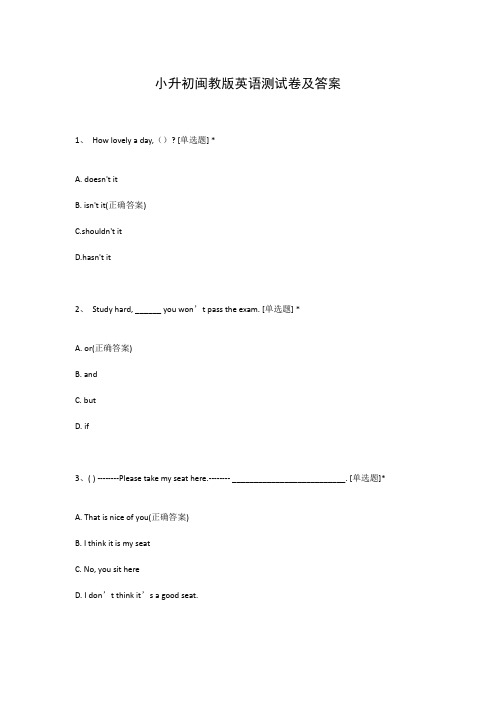
小升初闽教版英语测试卷及答案1、How lovely a day,()? [单选题] *A. doesn't itB. isn't it(正确答案)C.shouldn't itD.hasn't it2、Study hard, ______ you won’t pass the exam. [单选题] *A. or(正确答案)B. andC. butD. if3、( ) --------Please take my seat here.-------- __________________________. [单选题]*A. That is nice of you(正确答案)B. I think it is my seatC. No, you sit hereD. I don’t think it’s a good seat.4、He was?very tired,so he stopped?_____ a rest. [单选题] *A. to have(正确答案)B. havingC. haveD. had5、I don’t like snakes, so I ______ read anything about snakes.()[单选题] *A. alwaysB. usuallyC. oftenD. never(正确答案)6、I’m not sure whether we’ll go on ______ foot or by _____ bike? [单选题] *A. the; theB. /; theC. /; /(正确答案)D. the; /7、Fresh _______ is good for our health. [单选题] *A. climateB. skyC. weatherD. air(正确答案)8、87.—Could you? ? ? ? ? ? me the way to the nearest hospital?—Sure. [单选题] *A.askB.tell(正确答案)C.talkD.speak9、Your father is very busy, so he ______ play football with you this afternoon.()[单选题] *A. doesn’tB. don’tC. isn’tD. won’t(正确答案)10、My brother is too shy. He _______ speaks in front of lots of people. [单选题] *A. alwaysB. usuallyC. seldom(正确答案)D. sometimes11、--I can’t watch TV after school.--I can’t, _______. [单选题] *A. alsoB. tooC. either(正确答案)D. so12、These oranges look nice, but _______ very sour. [单选题] *A. feelB. taste(正确答案)C. soundD. look13、The commander said that two _____ would be sent to the Iraqi front line the next day. [单选题] *A. women's doctorB. women doctorsC. women's doctorsD. women doctor(正确答案)14、8.Turn right ________ Danba Road and walk ________ the road, then you will findMeilongMiddle school. [单选题] *A.in...alongB.into...along (正确答案)C.in...onD.into...on15、Mary is interested ______ hiking. [单选题] *A. onB. byC. in(正确答案)D. at16、My mother’s birthday is coming. I want to buy a new shirt ______ her.()[单选题] *A. atB. for(正确答案)C. toD. with17、I used to take ____ long way to take the bus that went by ____ tunnel under the water. [单选题] *A. a, aB. a. theC. a, /(正确答案)D. the, a18、Customers see location as the first factor when_____a decision about buying a house. [单选题] *A.makeB.to makeC.making(正确答案)D.made19、She passed me in the street, but took no()of me. [单选题] *Attention (正确答案)B. watchC. careD. notice20、Tony is a quiet student, _______ he is active in class. [单选题] *A. soB. andC. but(正确答案)D. or21、The manager was quite satisfied with his job. [单选题] *A. 担心的B. 满意的(正确答案)C. 高兴的D. 放心的22、59.—Can I talk to the manager?—Please wait ________ minute. [单选题] *A.anB.a(正确答案)C.theD./23、It was _____the policeman came_____the parents knew what had happened to their son. [单选题] *A.before…asB. until…whenC. not until…that(正确答案)D.until…that24、Look! There are some boats ______ the river.()[单选题] *A. on(正确答案)B. overC. betweenD. in25、39.—What do you ________ my new dress?—Very beautiful. [单选题] * A.look atB.think aboutC.think of(正确答案)D.look through26、—______ is the concert ticket?—It’s only 160 yuan.()[单选题] *A. How manyB How much(正确答案)C. How oftenD. How long27、Many young people like to _______ at weekends. [单选题] *A. eat out(正确答案)B. eat upC. eat onD. eat with28、Every morning John takes a()to his office. [单选题] *A. 20-minutes' walkB. 20 minute ' walkC. 20-minutes walkD. 20-minute walk(正确答案)29、--What are you going to be in the future?--I want to be _______ actor. [单选题] *A. aB. an(正确答案)C. theD. /30、—The weather in Shanghai is cool now, ______ it? —No, not exactly. ()[单选题] *A. doesn’tB. isC. isn’t(正确答案)D. does。
六年级英语 小升初每日一练(31)闽教版
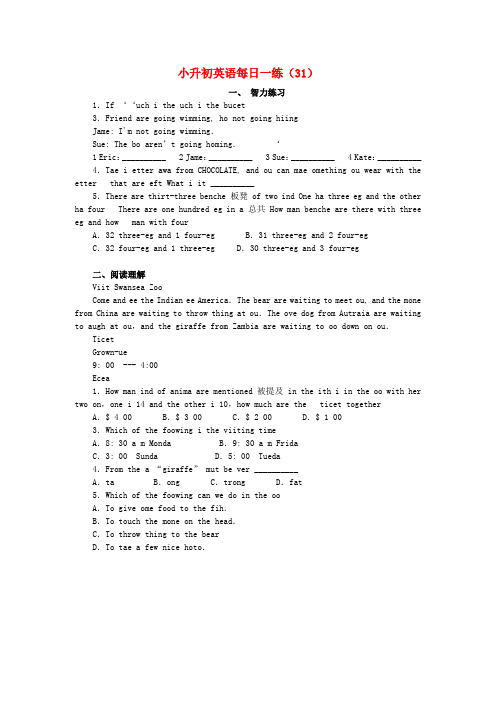
小升初英语每日一练(31)一、智力练习1.If ‘‘uch i the uch i the bucet3.Friend are going wimming, ho not going hiingJame: I'm not going wimming.Sue: The bo aren’t going homing.‘1 Eric:__________2 Jame:__________3 Sue:__________4 Kate:__________4.Tae i etter awa from CHOCOLATE, and ou can mae omething ou wear with the etter that are eft What i it __________5.There are thirt-three benche 板凳 of two ind One ha three eg and the other ha four There are one hundred eg in a 总共 How man benche are there with three eg and how man with fourA.32 three-eg and 1 four-eg B.31 three-eg and 2 four-egC.32 four-eg and 1 three-eg D.30 three-eg and 3 four-eg二、阅读理解Viit Swansea ZooCome and ee the Indian ee America.The bear are waiting to meet ou, and the mone from China are waiting to throw thing at ou.The ove dog from Autraia are waiting to augh at ou,and the giraffe from Zambia are waiting to oo down on ou.TicetGrown-ue9: 00 --- 4:00Ecea1.How man ind of anima are mentioned 被提及 in the ith i in the oo with her two on,one i 14 and the other i 10,how much are the ticet together A.$ 4 00 B.$ 3 00 C.$ 2 00 D.$ 1 003.Which of the foowing i the viiting timeA.8: 30 a m Monda B.9: 30 a m FridaC.3: 00 Sunda D.5: 00 Tueda4.From the a “giraffe” mut be ver __________A.ta B.ong C.trong D.fat5.Which of the foowing can we do in the ooA.To give ome food to the fih.B.To touch the mone on the head.C.To throw thing to the bearD.To tae a few nice hoto.。
六年级英语 小升初每日一练(30) 闽教版
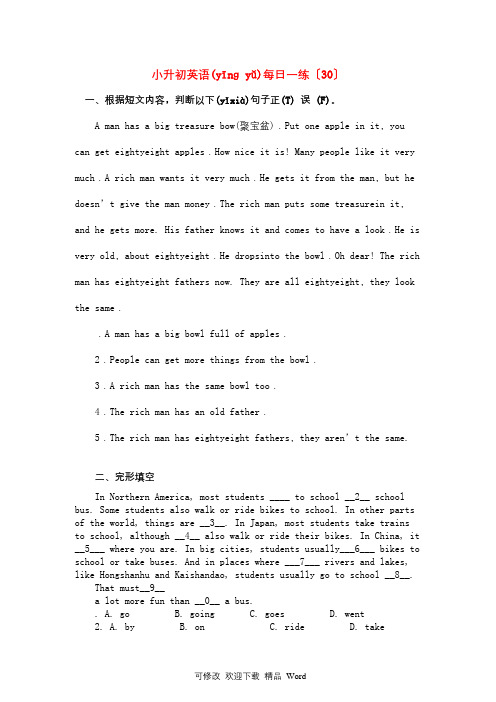
小升初英语(yīnɡ yǔ)每日一练〔30〕一、根据短文内容,判断以下(yǐxià)句子正(T) 误 (F)。
A man has a big treasure bow(聚宝盆).Put one apple in it,you can get eightyeight apples.How nice it is! Many people like it very much.A rich man wants it very much.He gets it from the man,but he does n’t give the man money.The rich man puts some treasurein it,and he gets more. His father knows it and comes to have a look.He is very old,about eightyeight.He dropsinto the bowl.Oh dear! The rich man has eightyeight fathers now. They are all eightyeight,they look the same..A man has a big bowl full of apples.2.People can get more things from the bowl.3.A rich man has the same bowl too.4.The rich man has an old father.5.The rich man has eightyeight fathers,they aren’t the same.二、完形填空In Northern America, most students ____ to school __2__ school bus. Some students also walk or ride bikes to school. In other parts of the world, things are __3__. In Japan, most students take trains to school, although __4__ also walk or ride their bikes. In China, it __5___ where you are. In big cities, students usually___6___ bikes to school or take buses. And in places where ___7___ rivers and lakes, like Hongshanhu and Kaishandao, students usually go to school __8__.That must__9__a lot more fun than __0__ a bus.. A. go B. going C. goes D. went2. A. by B. on C. ride D. take3. A. different B. differenceC. sameD. the different4. A. another B. the other C. other D. others5. A. depend on B. depend toC. depends toD. depends on6. A. rides B. ride C. on D. by7. A. there are B. there is C. is there D. are there8. A. by train B. by taxi C. by boatD. on foot9. A. to be B. isC. beingD. be0. A. take B. to take C. taking D. takes内容总结(1)小升初英语每日一练〔30〕一、根据短文内容,判断以下句子正(T) 误 (F)。
六年级下册英语试题--小升初基础达标检测(精选试卷)闽教版(含答案)
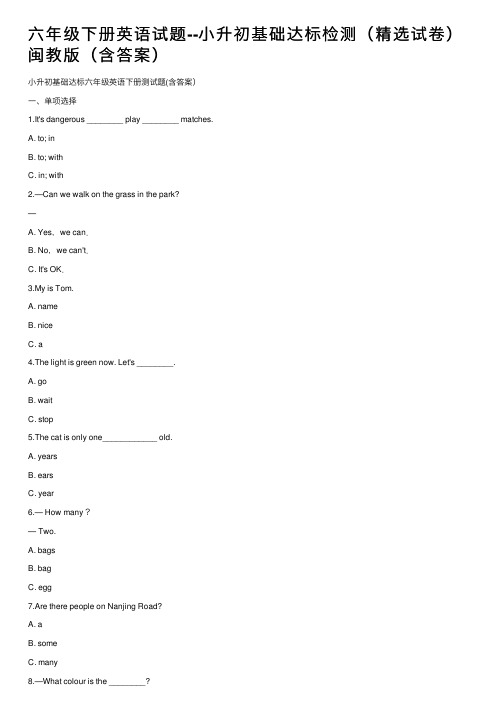
六年级下册英语试题--⼩升初基础达标检测(精选试卷)闽教版(含答案)⼩升初基础达标六年级英语下册测试题(含答案)⼀、单项选择1.It's dangerous ________ play ________ matches.A. to; inB. to; withC. in; with2.—Can we walk on the grass in the park?—A. Yes,we can.B. No,we can't.C. It's OK.3.My is Tom.A. nameB. niceC. a4.The light is green now. Let's ________.A. goB. waitC. stop5.The cat is only one____________ old.A. yearsB. earsC. year6.— How many ?— Two.A. bagsB. bagC. egg7.Are there people on Nanjing Road?A. aB. someC. many8.—What colour is the ________?—It is orange.A. tarosB. Orange9.Kitty can play _______ football. She can also play _______ drum.A. the, theB. /, theC. /, the10.Have you their addresses and telephone numbers ?A. written, downB. written, offC. written, awayD. written, on11.—How do you go to school every day?—________.A. By busB. By the busC. By a bus12.Is your teachers' room big _______ small?A. andB. forC. or13.—How much Bob weigh?—He weighs 45 kilograms.A. doB. doesC. did14.How _______ is your pencil?A. tallB. longC. longer15.选出画线部分发⾳不同的⼀项。
六年级英语 小升初每日一练(64) 闽教版
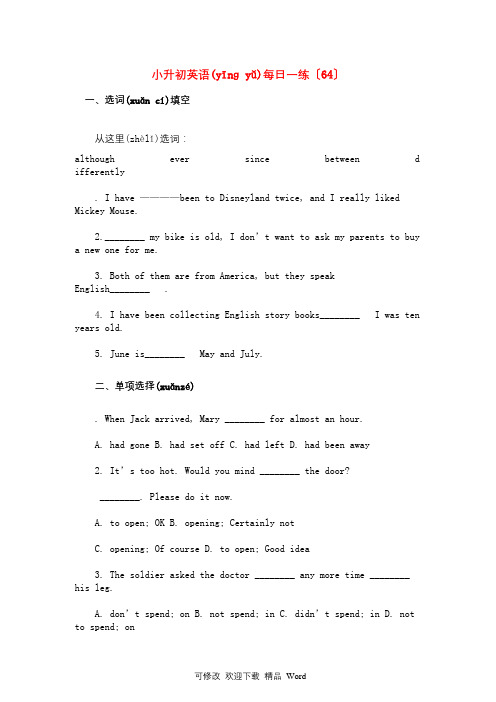
小升初英语(yīnɡ yǔ)每日一练〔64〕一、选词(xuǎn cí)填空从这里(zhèlǐ)选词:although ever since between d ifferently. I have ————been to Disneyland twice, and I really liked Mickey Mouse.2.________ my bike is old, I don’t want to ask my parents to buya new one for me.3. Both of them are from America, but they speakEnglish________ .4. I have been collecting English story books________ I was ten years old.5. June is________ May and July.二、单项选择(xuǎnzé). When Jack arrived, Mary ________ for almost an hour.A. had goneB. had set offC. had leftD. had been away2. It’s too hot. Would you mind ________ the door?________. Please do it now.A. to open; OKB. opening; Certainly notC. opening; Of courseD. to open; Good idea3. The soldier asked the doctor ________ any more time ________ his leg.A. don’t spend; onB. not spend; inC. didn’t spend; inD. not to spend; on4. Each person will have between one half to one square metres of space ________.A. to liveB. to live onC. to live inD. to be lived5. Chinese people were cheering at the most ________ moment when Liu Xiang brokethe world record.A. excitedB. to exciteC. exciteD. exciting6. From the following note, we know ________ telephone number is 2860384.Telephone MessageFrom: Tony To: BobDate: October st Time: 8:0 a. m.Message: Please call him. His telephone number is 2860384.A. Bob’sB. Tony and Bob’sC. Jim’sD. Tony’s内容总结(1)Certainly notC. opening。
六年级下册英语试题--小升初基础达标检测(六) 闽教版(含答案)
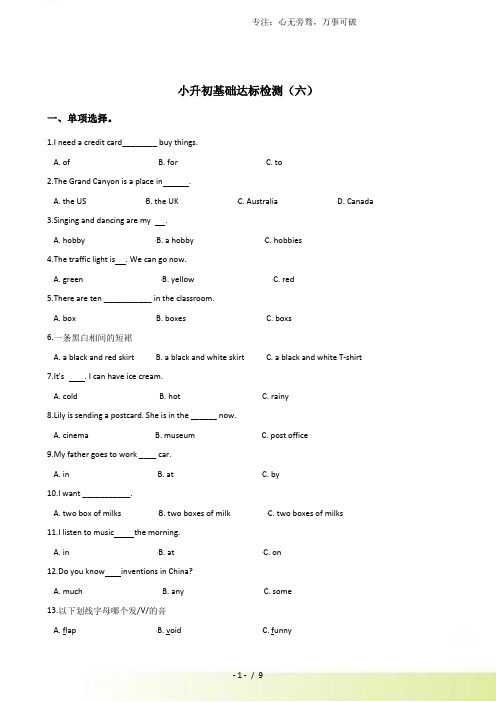
小升初基础达标检测(六)一、单项选择。
1.I need a credit card________ buy things.A. ofB. forC. to2.The Grand Canyon is a place in .A. the USB. the UKC. AustraliaD. Canada3.Singing and dancing are my .A. hobbyB. a hobbyC. hobbies4.The traffic light is . We can go now.A. greenB. yellowC. red5.There are ten ___________ in the classroom.A. boxB. boxesC. boxs6.一条黑白相间的短裙A. a black and red skirtB. a black and white skirtC. a black and white T-shirt7.It's . I can have ice cream.A. coldB. hotC. rainy8.Lily is sending a postcard. She is in the ______ now.A. cinemaB. museumC. post office9.My father goes to work ____ car.A. inB. atC. by10.I want ___________.A. two box of milksB. two boxes of milkC. two boxes of milks11.I listen to music the morning.A. inB. atC. on12.Do you know inventions in China?A. muchB. anyC. some13.以下划线字母哪个发/V/的音A. flapB. voidC. funny二、口语交际。
闽教版2019-2020学年六年级下学期英语小升初试卷(II)卷
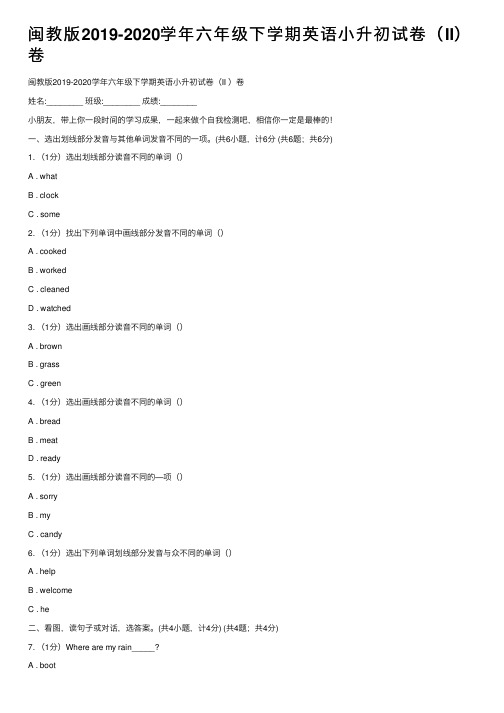
闽教版2019-2020学年六年级下学期英语⼩升初试卷(II)卷闽教版2019-2020学年六年级下学期英语⼩升初试卷(II )卷姓名:________ 班级:________ 成绩:________⼩朋友,带上你⼀段时间的学习成果,⼀起来做个⾃我检测吧,相信你⼀定是最棒的!⼀、选出划线部分发⾳与其他单词发⾳不同的⼀项。
(共6⼩题,计6分 (共6题;共6分)1. (1分)选出划线部分读⾳不同的单词()A . whatB . clockC . some2. (1分)找出下列单词中画线部分发⾳不同的单词()A . cookedB . workedC . cleanedD . watched3. (1分)选出画线部分读⾳不同的单词()A . brownB . grassC . green4. (1分)选出画线部分读⾳不同的单词()A . breadB . meatD . ready5. (1分)选出画线部分读⾳不同的—项()A . sorryB . myC . candy6. (1分)选出下列单词划线部分发⾳与众不同的单词()A . helpB . welcomeC . he⼆、看图,读句⼦或对话,选答案。
(共4⼩题,计4分) (共4题;共4分)7. (1分)Where are my rain_____?A . bootB . bootsC . boatD . boats8. (1分)New Year's Day is on .A . January 1stB . January 15thC . January 25th9. (1分)Are you Mr ?B . rabbitC . Pig10. (1分)Today is World Car Free Day. We go to school_______.A . by carB . by taxiC . by bike三、读句⼦或对话,选择最佳答案。
六年级下册英语试题--小升初基础达标检测(精选试卷) 闽教版(含答案)
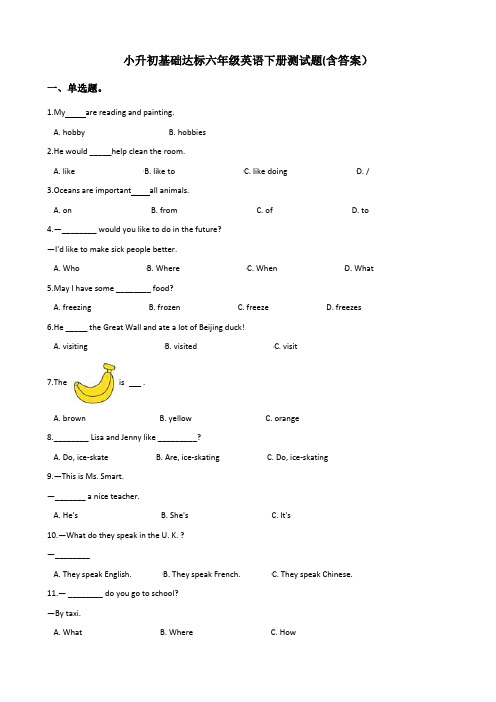
小升初基础达标六年级英语下册测试题(含答案)一、单选题。
1.My are reading and painting.A. hobbyB. hobbies2.He would _____help clean the room.A. likeB. like toC. like doingD. /3.Oceans are important all animals.A. onB. fromC. ofD. to4.—________ would you like to do in the future?—I'd like to make sick people better.A. WhoB. WhereC. WhenD. What5.May I have some ________ food?A. freezingB. frozenC. freezeD. freezes6.He _____ the Great Wall and ate a lot of Beijing duck!A. visitingB. visitedC. visit7.The is .A. brownB. yellowC. orange8.________ Lisa and Jenny like _________?A. Do, ice-skateB. Are, ice-skatingC. Do, ice-skating9.—This is Ms. Smart.—_______ a nice teacher.A. He'sB. She'sC. It's10.—What do they speak in the U. K. ?—________A. They speak English.B. They speak French.C. They speak Chinese.11.— ________ do you go to school?—By taxi.A. WhatB. WhereC. How12.What's wrong with ?A. himB. heC. his13.—Is this your pen holder, Alice?—No, it's Jill's. is yellow, this one is red.A. HersB. MineC. My14.当你想邀请你的小伙伴一起去上学时,你可以说:A. How are you?B. Let's go to school.15.—Does Linda like the black bag ________ the green bag?—She likes ________ black one.A. or, theB. and, theC. or, /二、选词填空。
六年级下册英语试题 小升初基础达标检测(精选试卷) 闽教版(含答案)
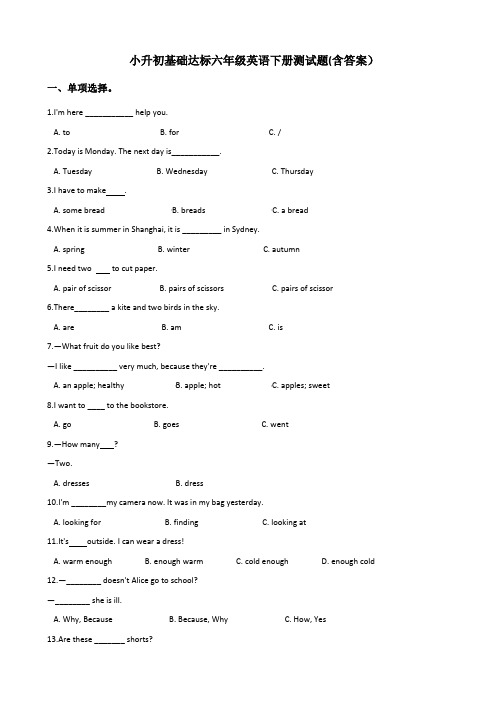
小升初基础达标六年级英语下册测试题(含答案)一、单项选择。
1.I'm here ___________ help you.A. toB. forC. /2.Today is Monday. The next day is___________.A. TuesdayB. WednesdayC. Thursday3.I have to make .A. some breadB. breadsC. a bread4.When it is summer in Shanghai, it is _________ in Sydney.A. springB. winterC. autumn5.I need two to cut paper.A. pair of scissorB. pairs of scissorsC. pairs of scissor6.There________ a kite and two birds in the sky.A. areB. amC. is7.—What fruit do you like best?—I like __________ very much, because they're __________.A. an apple; healthyB. apple; hotC. apples; sweet8.I want to ____ to the bookstore.A. goB. goesC. went9.—How many ?—Two.A. dressesB. dress10.I'm ________my camera now. It was in my bag yesterday.A. looking forB. findingC. looking at11.It's outside. I can wear a dress!A. warm enoughB. enough warmC. cold enoughD. enough cold12.—________ doesn't Alice go to school?—________ she is ill.A. Why, BecauseB. Because, WhyC. How, Yes13.Are these _______ shorts?A. youB. IC. his14.The panda is ________.A. yellowB. white and black15.选出划线字母发音不同的单词()A. emptyB. enjoyC. everything二、口语交际。
2020闽教版英语六年级下册期末小升初知识点复习考试测试卷共五套

A、Yes, she is.
B、No, he isn’t.
C、No he is.
六、根据所提供的标点符号,把单词连成句子。(10 分) 1、is This book Zhang Peng’s ( . ) ____________________________________________ 2、doing My sister homework is ( . )
Chen: She is cooking dinner . _________3_________.
Woman: ________4_________.
Chen: Mom, ______5________.
Mom: Thank you .
A、 There is a call for you .
B、 This is Nina .
blue.
( )4. Can you skate?
D.
She is a doctor.
( )5. What do you like?
E.
He is thirty-three.
( )6. Are there any see-saws in the garden?
F. I
can see seven.
( )7. Show we go there by bike?
四、根据所给句子意思,选择正确的图片,把代号填入题前括号内。(10 分)
A
B
C
D
E ( )1、I like spring . Because it’s windy in spring, I can fly a kite . ( )2、I usually go hiking with my parents on the weekend . ( )3、Look! The elephant is drinking water . ( )4、It’s January 8th. It’s my birthday . ( )5、My father is answering the phone now .
六年级下册英语试题--小升初基础达标检测(五) 闽教版(含答案)
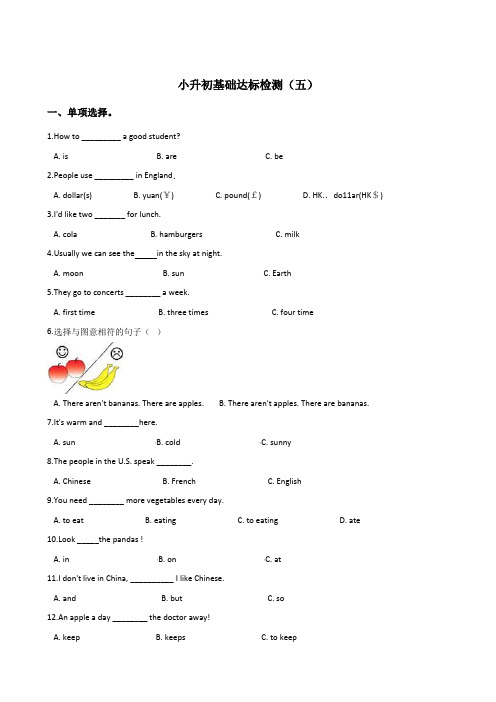
小升初基础达标检测(五)一、单项选择。
1.How to _________ a good student?A. isB. areC. be2.People use _________ in England.A. dollar(s)B. yuan(¥)C. pound(£)D. HK..do11ar(HK$)3.I'd like two _______ for lunch.A. colaB. hamburgersC. milkually we can see the in the sky at night.A. moonB. sunC. Earth5.They go to concerts ________ a week.A. first timeB. three timesC. four time6.选择与图意相符的句子()A. There aren't bananas. There are apples.B. There aren't apples. There are bananas.7.It's warm and ________here.A. sunB. coldC. sunny8.The people in the U.S. speak ________.A. ChineseB. FrenchC. English9.You need ________ more vegetables every day.A. to eatB. eatingC. to eatingD. ate10.Look _____the pandas !A. inB. onC. at11.I don't live in China, __________ I like Chinese.A. andB. butC. so12.An apple a day ________ the doctor away!A. keepB. keepsC. to keep13.Mum, we are _______.A. bagB. blackC. back14./'pa: tɪ/A. partyB. partC. park二、口语交际。
六 级英语 小升初每日一练(31)(无答案) 闽教版
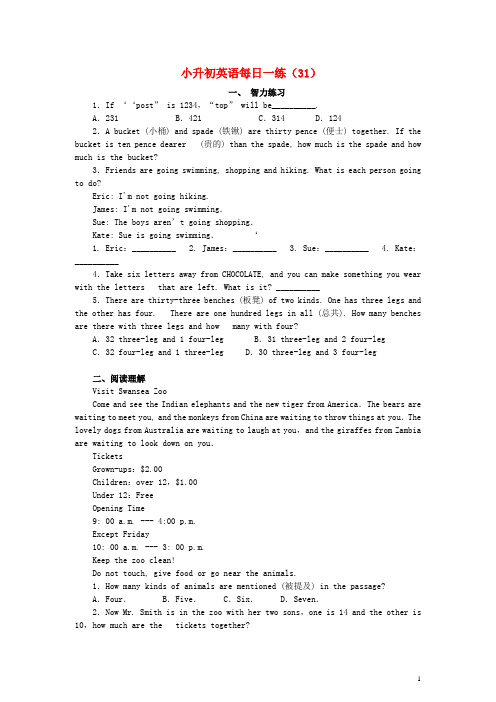
小升初英语每日一练(31)一、智力练习1.If ‘‘post” is 1234,“top” will be__________.A.231 B.421 C.314 D.1242.A bucket (小桶) and spade (铁锹) are thirty pence (便士) together. If the bucket is ten pence dearer (贵的) than the spade, how much is the spade and how much is the bucket?3.Friends are going swimming, shopping and hiking. What is each person going to do?Eric: I'm not going hiking.James: I'm not going swimming.Sue: The boys aren’t going shopping.Kate: Sue is going swimming.‘1. Eric:__________2. James:__________3. Sue:__________4. Kate:__________4.Take six letters away from CHOCOLATE, and you can make something you wear with the letters that are left. What is it? __________5.There are thirty-three benches (板凳) of two kinds. One has three legs and the other has four. There are one hundred legs in all (总共). How many benches are there with three legs and how many with four?A.32 three-leg and 1 four-leg B.31 three-leg and 2 four-legC.32 four-leg and 1 three-leg D.30 three-leg and 3 four-leg二、阅读理解Visit Swansea ZooCome and see the Indian elephants and the new tiger from America.The bears are waiting to meet you, and the monkeys from China are waiting to throw things at you.The lovely dogs from Australia are waiting to laugh at you,and the giraffes from Zambia are waiting to look down on you.TicketsGrown-ups:$2.00Children:over 12,$1.00Under 12:FreeOpening Time9: 00 a.m. --- 4:00 p.m.Except Friday10: 00 a.m. --- 3: 00 p.m.Keep the zoo clean!Do not touch, give food or go near the animals.1.How many kinds of animals are mentioned (被提及) in the passage?A.Four. B.Five. C.Six. D.Seven.2.Now Mr. Smith is in the zoo with her two sons,one is 14 and the other is 10,how much are the tickets together?A.$ 4. 00 B.$ 3. 00 C.$ 2. 00 D.$ 1. 003.Which of the following is the visiting time?A.8: 30 a. m. Monday B.9: 30 a. m. FridayC.3: 00 p. m. Sunday D.5: 00 p. m. Tuesday4.From the passage we can guess the animal “giraffe” must be very __________. A.tall B.long C.strong D.fat5.Which of the following can we do in the zoo?A.To give some food to the fish.B.To touch the monkeys on the heads.C.To throw things to the bearsD.To take a few nice photos.。
闽教版六年级下册英语试题--小升初基础达标检测(精选试卷)(含答案)
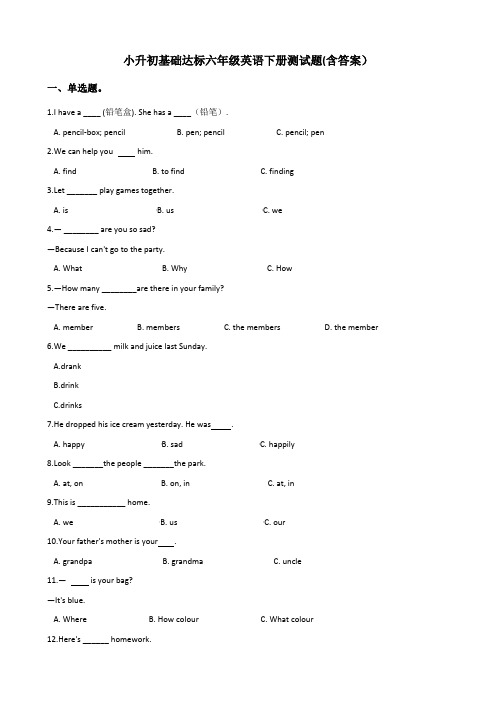
小升初基础达标六年级英语下册测试题(含答案)一、单选题。
1.I have a ____ (铅笔盒). She has a ____(铅笔).A. pencil-box; pencilB. pen; pencilC. pencil; pen2.We can help you him.A. findB. to findC. finding3.Let _______ play games together.A. isB. usC. we4.— ________ are you so sad?—Because I can't go to the party.A. WhatB. WhyC. How5.—How many ________are there in your family?—There are five.A. memberB. membersC. the membersD. the member6.We __________ milk and juice last Sunday.A.drankB.drinkC.drinks7.He dropped his ice cream yesterday. He was .A. happyB. sadC. happily8.Look _______the people _______the park.A. at, onB. on, inC. at, in9.This is ___________ home.A. weB. usC. our10.Your father's mother is your .A. grandpaB. grandmaC. uncle11.— is your bag?—It's blue.A. WhereB. How colourC. What colour12.Here's ______ homework.A. IB. youC. my13.A. This is Nancy. She is my friend.B. This is Tom. He is my friend.14.Do the lions like eating meat hay?A. tooB. orC. Either二、选词填空15.________(She/They)are Tom's grandparents.16.—Who is this ________?— He is my uncle. (lady/man)17.I ________(am / was) two then.18.Look at the taxi! It is not slow. It is________. (fast/slow)19.In spring, it's ________ (hot/warm).20.He's cutting grass to ________ (feed /grow) the animals.21.The pencils are ________ (in/in front of) the pencil box.22.Mother gives us a ________ (packet/pair) of sweets.23.Robot has ________(long hair/a big mouth/big eyes).24.It's________(on/in) the second floor.三、用所给单词的适当形式填空25.Please ________ (look) at the notice in the swimming pool. It says, “________ (not run) in the pool.”26.I'm so scared because I ________ (see) a big snake.27.It's not polite to ________ (laugh) at the boy when he ________ (need) help.28.Look! She ________(learn)Chinese now.29.I want three________(piece) of bread.30.Steve ________ (leave) home at seven every morning.31.My mother will ________ (do) the housework.32.I like ________ (paint) in Art Club. I can ________ (paint) well now.33.Listen, Mrs. Wang ________ (tell) the children a story about dinosaurs.34.Let's ________ (play) football after class.四、连词成句35.Purple favourite my is (. )________36.very, they, are, playing, well(.)37.near, bike, Tom, the, is(连词成句)38.matter is what you with the? (连词成句)39.job, her, is, What, (?) (连词成句)五、快乐阅读。
最新闽教版小升初英语--六年级英语升学考试模拟试题
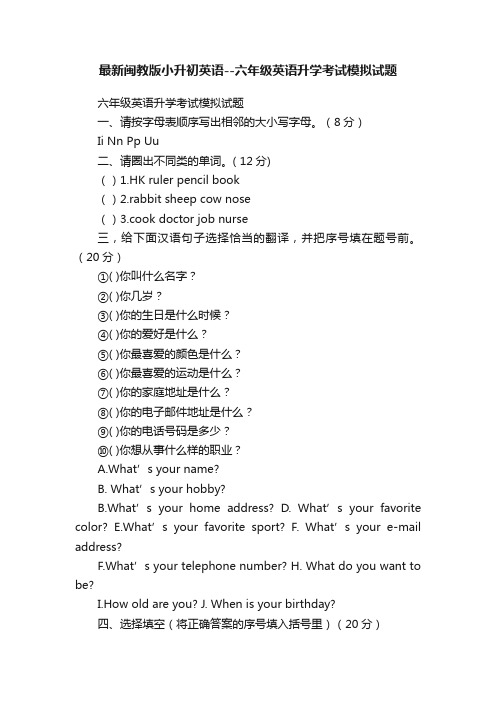
最新闽教版小升初英语--六年级英语升学考试模拟试题六年级英语升学考试模拟试题一、请按字母表顺序写出相邻的大小写字母。
(8分)Ii Nn Pp Uu二、请圈出不同类的单词。
( 12分)()1.HK ruler pencil book()2.rabbit sheep cow nose()3.cook doctor job nurse三,给下面汉语句子选择恰当的翻译,并把序号填在题号前。
(20分)①( )你叫什么名字?②( )你几岁?③( )你的生日是什么时候?④( )你的爱好是什么?⑤( )你最喜爱的颜色是什么?⑥( )你最喜爱的运动是什么?⑦( )你的家庭地址是什么?⑧( )你的电子邮件地址是什么?⑨( )你的电话号码是多少?⑩( )你想从事什么样的职业?A.What’s your name?B. What’s your hobby?B.What’s your home address? D. What’s your favorite color? E.What’s your favorite sport? F. What’s your e-mail address?F.What’s your telephone number? H. What do you want to be?I.How old are you? J. When is your birthday?四、选择填空(将正确答案的序号填入括号里)(20分)()1. I stayed in China. I visited___________A.the Summer PalaceB. the White House()2. 我想知道对方的电话号码,我应该怎么问?A: Who’s she? B. What’s your phone number?()3. May I_____ Sally, please?A.speak toB. speak()4. 想问别人穿的是什么颜色的衣服,你可以问?A.What color is it? B. This one?()5. What’s _______ with you?A.happenedB. wrong()6. In the past my mother________ my room.A.cleanedB. clean()7.A: ____________________ B:I’m eight.A.How old are you?B. How are you?()8. Where do birds live? They live in_________.A.waterB. trees.()9. 你同意把东西借给别人,你可以说:___________. A.Thank you. B. Here you are.()10. How many bananas? A. Three B. Two五、请给下列句子选择相应的图片,将其序号填在括号里。
- 1、下载文档前请自行甄别文档内容的完整性,平台不提供额外的编辑、内容补充、找答案等附加服务。
- 2、"仅部分预览"的文档,不可在线预览部分如存在完整性等问题,可反馈申请退款(可完整预览的文档不适用该条件!)。
- 3、如文档侵犯您的权益,请联系客服反馈,我们会尽快为您处理(人工客服工作时间:9:00-18:30)。
小升初英语每日一练(50)
一.选出不同类的词
( ) 1. A. sour B. young C. hour D. our
( ) 2. A. pig B. potato C. horse D. sheep
( ) 3. A. Mon. B. Wed. C. A.M. D. Fri.
( ) 4. A. pork B. fish C. beef D. onion
( ) 5. A. sour B. salty C. sweet D. swim
二.完形填空
The term home schooling means educating children at home or in places other than a normal setting such
as a public or private school. There are many reasons why parents choose home schooling for their
children. Some parents are 1 with the quality of education in the public schools. Others do not want
their children to have to worry about “peer pressure”, or social pressure from friends. They say it may have
a(n) 2 effect on the child’s studies. T hese parents 3 this type of pressure will lead to bad behavior
such as smoking, drinking alcohol, and taking drugs.
Bullying(欺负) from other students is another concern. Still other parents choose this type of 4 for
religious reasons. Whatever the 5 may be, it is evident that more and more children are being taken out
of normal schools every year. 6 , many questions have emerged, encouraging the debate over home
schooling against public schooling.
What then is the future of education? Will this new model of schooling replace normal schools? Will
computers and the Internet 7 our classrooms and teachers? As the debate continues, so do the
questions about what home schoolers are studying at home. How can parents ensure that their children
are prepared 8 for college? How are home schoolers assessed to make sure they are getting the
same educational standards that school students must have?
Finally, there are questions regarding the children’s emot ional development. Are they too 9 their fellow
students? Are they 10 the opportunity to get the social benefits of being in a large classroom of
students? As with any debatable issue, the answers to these questions are neither simple nor one-sided.
( ) 1. A. patient B. familiar C. pleased D. dissatisfied
( ) 2. A. active B. contrary C. important D. negative
( ) 3. A. care B. fear C. wish D. deny
( ) 4. A. activity B. education C. behavior D. belief
( ) 5. A. effects B. suggestions C. reasons D. pressures
( ) 6. A. As a result B. On the whole C. After all D. On the contrary
( ) 7. A. replace B. reserve C. represent D. release
( ) 8. A. gracefully B. emotionally C. academically D. financially
( ) 9. A. free from B. isolated from C. related to D. close to
( ) 10. A. providing B. making C. taking D. losing。
